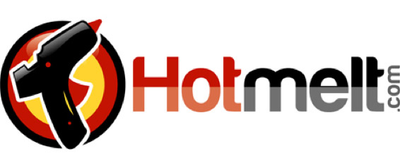Everyday, thousands of manufacturing and distribution companies utilize some form of industrial adhesive on the production line. Whether it’s packaging alcoholic beverages, binding books, assembling furniture, or stamp and envelope production, having a reliable, quality adhesive on your production line can mean the difference between high productivity and expensive production costs. But how do you know what kind of adhesive you need for your industry, and how do you find a company that produces a reliable adhesive?
Hot Melt Adhesives
There are several kinds of industrial adhesives available on the market. The most popular kind, by far, is the hot melt adhesives family. Hot melt adhesives are polymer based, and are thermoplastic in nature, meaning they are solid at room temperature. These are generally applied as either a molten film or in a series of beads that is converted to a solid form when the materials cool and set. Because hot melt adhesives do not utilize water or solvents, they also have a very fast set time, which makes them the more popular kind of industrial adhesive.
Types
The two most popular types of hot melt glues are ethylene-vinyl acetate (EVA) and polyolefin, or metallocene. Let’s take a closer look at these two different types.
1. Ethylene-vinyl acetate (EVA) – this form of hot melt adhesive works well with paper and cellulosic materials and has a wide range of formulation. These adhesives set quickly and offer strong resistance properties and operate in a moderate range of temperatures. They are used in the packaging, converting, paper, automotive, and assembly industries, and are a generally more affordable kind of hot melt adhesive.
2. Polyolefin – these hot melt adhesives are made with a catalyzed metallocene base, and has excellent adhesive qualities and an even faster set set speed. It is also extremely resistant and services a vast range of temperatures. These adhesives are also used in the packagaing, converting, and assembly industries, but are limited in their range of available formulations; they are also generally more expensive, but definitely more economical on a per-use basis.
Industries
Industrial adhesives service a wide range of industries, from paper and packaging, to woodworking and the automotive industry. Hot melt adhesives, in particular, are commonly used for case and carton sealing and assembly, container labeling, and paper converting.
Advantages
There are several advantages to using hot melt adhesives. Hot melt adhesives have a very fast set speed, and feature moderate resistance properties. Depending on the forumulation being used, they also are also applicable in a wide range of temperatures and industries, and feature excellent adhesive qualities. Along with their affordability and quality, these features continue to make hot melt adhesives the more popular form of industrial adhesive currently avaialbe on the market.
Water-Based Adhesives
Another, less popular, but just as dynamic form of industrial adhesive is the water-based family of adhesives. These adhesives are supplied to manufacturers and distributors as either a pre-mixed solution or as formulated dry powders that must be mixed with water in order to activate its adhesive quality. Water-based adhesives are generally applied as emulsion mixes that are converted to adhesive materials when their water content has evaporated.
Types of Water-Based Adhesives
Water-based adhesives may not be as popular as hot melt adhesives in most industries, but they do have a wide variety of applications that makes them just as reliable and trustworthy as their more popular counterparts. Let’s take a brief look at the various kinds of water-based adhesives available on the market.
1. Starch/Dextrin Adhesives – these water-based adhesives contain a starch base that results in a more flexible, but solid bond. These are commonly used for paper applications like bookbinding.
2. Protein/Caesin Adhesives – derived from proteins found in animal milk that is used to make casein glue. Used for applications that require a fast set time, like packaging in the beer and wine industry.
3. Resin/Polymer Acetate Adhesives – made from emulsion polymers like vinyl and ethylene vinyl acetate. These emulsions produce a bright white mixture that produces a clear, flexible bond when dry, making it ideal for the paper, woodworking, and plastic industries.
4. Latex Adhesives – made from emulsified elastomers (rubbers). Depending on the specific formulation, these adhesives form either solid bond, or a more flexible bond that is used in applications like stamp and envelope production, and for binding fabrics and wood.
Industries
Several industries regularly use water-based adhesives for their manufacturing and distribution applications. The paper industry utilizes such adhesives for bookbinding and for binding paper towel rolls, while industries like beverage bottling companies use these adhesives for packaging cases of beer and fixing company labels to bottles that are regularly exposed to some degree of moisture.
Other industries that benefit from using water-based adhesives include the woodworking industry, the plastic and fabric industries, and as laminate material in the graphic arts industry.
Advantages
There are several advantages to using water-based adhesives. To begin with, water-based adhesives service a huge variety of industries because of their ability to bind to a wide range of substrates. They also remain stable in high levels of humidity and across a wide temperature range, and form extremely strong and durable bonds. Along with their flexibility and economic practicality, water-based adhesives can also be dispensed using several methods, including spray and roll dispersion technology.
Depending on what industry you are in and what applications you are handling, you will want to do a little bit of research into the various types of hot melt and water-based adhesives to know exactly what you are looking for. Remember that while hot melt adhesives are the more popular, water-based adhesives offer excellent adhesive qualities and service a wide range of temperatures and are more resistant to moisture. For assistance or more information regarding these various types of adhesives and their applications, visit hotmelt.com or contact us at (877) 933-3343.

